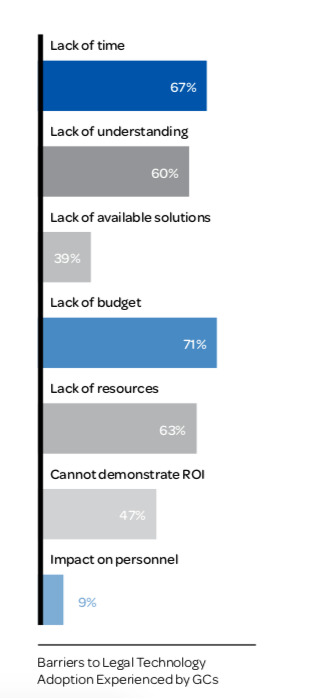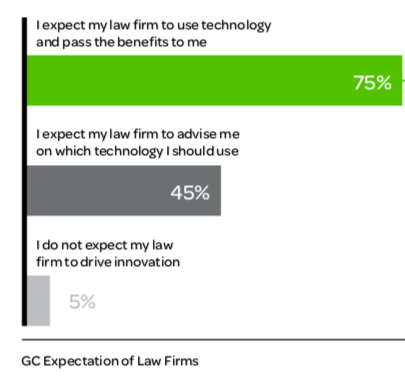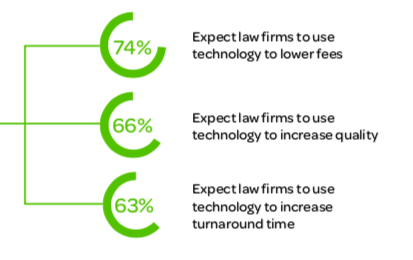
A new report by LexisNexis has found what most of the market has known for some time: the relationship between General Counsel (GC) and legal technology is not always a comfortable or easy one.
The report is based on a survey which found plenty of interesting nuggets of info. A few of Artificial Lawyer’s favourites are below.
1 – Many Inhouse Legal Teams Are Not Set Up for Legal Tech Innovation, Adoption or Execution
When asked what the main barriers were to legal tech adoption the three issues were: a lack of resources; a lack of time to get their heads around the issues and deal with it all; and also a lack of understanding of the tech and what it can do.
In short, GCs have been very busy….but not with legal tech, and that is no surprise.
Most of the sessions at conferences Artificial Lawyer attends where GCs are speaking on tech are fairly uninspiring moments. They tend to be a litany of reasons why little change among inhouse teams takes place. A conference for GCs and tech a couple of months ago even saw a GC for a major FTSE company say loud and clear: ‘I have no interest in legal technology.’ They even sounded a bit sorry for people who did focus on this area.
Of course there are also companies, ranging from Google, to NetApp, to Vodafone, to BT, whose inhouse legal teams are very much focused on legal tech and innovation and doing a great job – but, the truth is they are not the majority.
But – why are we surprised by this? GCs don’t have ‘legal tech implementation’ in their job descriptions. They have also got used to being spoon fed innovations by law firms. It’s a bad habit, but one that is hard to break.
And, as noted in the table, inhouse teams don’t usually get given a budget to spend on testing out AI doc review tech, for example. It all makes legal tech a tricky area for CGs.
Change will come when expectations of inhouse legal teams change from within the companies they work for.
2 – Spoon-Feeding is an Issue
Too many GCs are used to being spoon-fed innovation by someone else (see the data above). And we wonder why inhouse legal teams are not at the vanguard of the new wave of legal tech….? Enough said.
3) Expectations Are Predictable
GCs want law firms to use tech to make the legal services they deliver to be: cheaper, better, faster (in that order it appears…). But, what else could they expect? They could want better data insights too. Yet, when we think of tech we do tend to think in these terms, i.e. what will this do for me…? How does it improve my life?
Meanwhile, and quite naturally, the lawyers in firms wielding the new wave of legal tech are not always thinking this way about GCs. They may be thinking: how will this tech make my own life easier, my PEP higher…?
There will always be a balance of needs when there is a change in the means of legal production. Eventually we will get to an equilibrium. At present, the expectations are still in flux, and that is also to be expected this early on in the current epoch of legal market change. It’s early days.
—
Thanks to LexisNexis for the data and graphs.



We also need to bear in mind that the majority of businesses that these GCs support and who provide them with a budget are not in the business of legal innovation. It is not unreasonable therefore to expect those organisations who are in the business of providing legal services to take the lead and bear the investment of this.